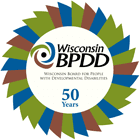Quality Improvement: States
Why Quality Home and Community Based Services Matter to States
During the last two decades, the number of individuals with intellectual and developmental disabilities (I/DD) living in community settings and receiving home and community-based services (HCBS) increased dramatically. While this led to better outcomes, including people with I/DD making more of their own choices and being a part of the community, there are great variations in the accessibility of quality HCBS (4). However, the current “progress toward community living that has been made in services for people with I/DD over decades is now in jeopardy — because of catastrophic labor shortages and pervasive high turnover rates among the workforce that supports them, direct support professionals (DSPs)” (5).
When states support the direct care workforce through promising practices like credentialing, standard training, and innovative funding approaches, the potential for quality in services increases (6). State commitment of resources, as many have done through American Rescue Plan Act initiatives, allows for innovation in practices and shared learning opportunities (7).
Wisconsin used a portion of the American Rescue Plan Act (ARPA) funding to focus on staff stability and direct care workforce training. The Wisconsin Department of Health Services (DHS) participated in a Workforce Survey in 2021 along with 28 other states. The survey was completed by agencies that provide long-term supports. In Wisconsin, 204 service providers completed the survey. Data from the survey of workforce included average wage($13.53), health insurance (39.9%), paid time off (62.3%), turnover ratio (49.9%) and vacancy rate 15.7 full-time and 16.8 part-time.
Link to Report 2021 State of the Workforce Report for Wisconsin
How States Can Improve Home and Community-Based Services
Require Rights Assessments and Education
- Require that all participants be assessed for their knowledge of their rights, including their human rights, choice-making rights, and rights as a program participant.
- Individuals should have the opportunity to participate in rights education services that allow them to grow their knowledge of their rights and comfort with accessing and protecting their rights.
- Ensure provider quality and accountability by requiring providers to have or participate in Human Rights Committees that limit and evaluate rights restrictions placed on individuals receiving services.
- Encourage providers to use person centered rights education tools such as the Living Well “Let’s Talk About Rights” Guides
Support Service Provider Growth Through Innovative Funding
- Promote quality services through funding mechanisms that promote innovation
Use funding methods like pay for performance initiatives that encourage providers to focus on participant outcomes and not on maintaining the same level of support to participants over time. - Implement a mechanism to regularly review rates to ensure that qualified caregivers are receiving market competitive rates in order to maintain a quality workforce.
Adequate Provider Network
- Ensure that enough quality providers are available for individuals to make choices in their services and are empowered to hold providers accountable for meeting their service needs and expectations.
- Staff trainings on state mandated care components should be standardized across providers and quality training programs like Open Futures Learning, College of Direct Supports should be made available so that organizations of any size have the means to access quality trainings.
- Direct support professionals should be given the opportunity to advance on a career ladder by completing continuing education and certifications as well as a proven history of providing quality care.
Prioritize Person-Centered Planning
- Require all agencies and providers to adopt evidence-based person-centered planning tools to ensure that services are participant driven and tailored to individual needs.
- Promote the use of tools that comprehensively evaluate the persons goals and desires, their interests, and their community.
Promote Agency Quality Improvement Measures Through Provider-led Assessment
- Encourage providers to implement accountability measures like a self-assessment tool on a yearly or semi-annual basis that allows staff and leadership to look for opportunities for quality improvement and celebrate areas of quality growth.
Evaluation of Quality through Participant Feedback
- Learn how the Council on Quality and Leadership’s Basic Assurances® and Personal Outcome Measures® (POM) can be used to guide quality improvement efforts.
- States should evaluate provider quality through evaluation data from participants and by regularly soliciting participant input in the form of listening sessions, advisory committees and focus groups for quality improvement initiatives.
Use Contracts and Waivers to Embed Quality Measures
- Codify standards of practice into contracts and waiver renewals to create clear expectations for providers.
- Set measurable goals in contracts and have evaluation, collection and reporting methods in place to measure progress in real time across the length of the contract or waiver.
- Provide clear and transparent feedback to providers and individuals receiving services on what goals are being met and what areas for improvement exists.
Building Relationships with and within State Agencies
- Communities of practice should be established in collaboration with state agencies that provide feedback opportunities for providers, individuals with lived experience, and state agencies.
- Agencies should work to dismantle silos in state agencies by working in interdisciplinary teams to review trends, growth opportunities, and shared measurable outcomes.
Tools for States
Human Rights Committee– States have varying frameworks and regulation around Human Rights Committees. Some states do not have any regulation around Human Rights Committees at all. CQL offers a webinar and FAQ on developing effective Human Rights Committees.
Let’s Talk About Rights Guides and Videos- These WI BPDD’s Living Well guides and videos can help agency staff, guardians and people who receive support learn about rights.
Basic Assurances – The Basic Assurances® is a tool developed by the Council on Quality and Leadership (CQL) to evaluate the essential, fundamental, and non-negotiable requirements of all human service organizations and system. The Basic Assurances® provide organizations with guidance for ensuring that systems translate into actual practices to positively impact the lives of people with intellectual and developmental disabilities, and psychiatric disabilities.
Personal Outcome Measures (POM) – The Personal Outcome Measures® (POM) is a person-centered discovery tool developed by CQL to explore the presence, importance, and achievement of personally-defined outcomes, along with the supports that help people attain their individual goals and dreams. 21 indicators are used to gain valuable insight into the lives of people with disabilities. The interview covers a variety of topics, including choice, health, safety, social capital, relationships, rights, employment, and more. For decades, the internationally recognized tool has been an effective data set for valid and reliable measurement of individual quality of life.
Living Well Agency Self-Assessment – This agency self-assessment provides an opportunity to gain full understanding of an agency’s policies, procedures and practices related to providing high quality HCBS. It focuses on ten domains and includes select factors and probes from the Council on Quality and Leadership’s (CQL) Basic Assurances. After completing this tool, choose your top three domains to focus your quality improvement work.
Open Future Learning – Open Future Learning is an affordable, effective online training platform designed exclusively for agencies supporting people with IDD. Open Future Learning has collaborated with revolutionary thinkers and leaders in the IDD field to create thought provoking, engaging training content for staff on a wide variety of topics.
Certified Direct Care Professional Program– The Wisconsin Department of Health Services in partnership with the University of Wisconsin-Green Bay developed a training program with 14 core areas.
WisCaregiver Connections– The Wisconsin Department of Health Services developed a platform to connect employers and direct care workers.
Reflection Activity
Download the Reflection Activity to make your Quality Improvement Action Plan!

Navigate the Blueprint
Living Well Success Story
3 pilot providers were part of a group of 158 organizations that received $29,600,000 total funding through the DHS American Rescue Plan Act Innovation Grants.
Real Lives. Real Connections.
The Wisconsin Department of Health Services used a portion of their ARPA funding to establish a free Certified Direct Care Professional Program. This program improves the competency of direct care workers in 14 core areas. In addition, they developed an employment platform to help employers and direct care workers fund each other. Link to Report

